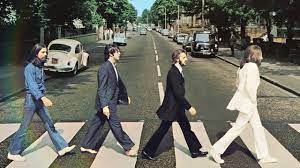Instruções:
Essas aulas de inglês são para alunos intermediários e avançados de inglês como segunda língua. Eles incluem “Ler”, “Ouvir” e “Escrever”. Basta seguir a lição respondendo às perguntas à medida que as encontra.
 Todas as vagas em negrito devem ser traduzidas para seu próprio idioma para ajudar na compreensão do novo vocabulário.
Todas as vagas em negrito devem ser traduzidas para seu próprio idioma para ajudar na compreensão do novo vocabulário.
Please LIKE & SUBSCRIBE my Youtube channel https://www.youtube.com/c/SteveBradeley/videos
This English lesson will take two hours to complete.
QUESTION 1: What is poetic licence?
QUESTION 2: What does the word ‘Beatles’ mean in your language?
INTRODUCTION:

Below you will find a song called ‘Eleanor Rigby’ recorded by a British band called The Beatles. The Beatles were an English rock band, formed in Liverpool in 1960, that comprised John Lennon, Paul McCartney, George Harrison and Ringo Starr. They are regarded as the most influential band of all time and were integral to the development of 1960s counterculture and popular music’s recognition as an art form.
VOCABULARY: recorded, influential, integral, counterculture, recognition
INSTRUCTIONS:
Listen and watch the music video below and then we are going to gramatically analyze the lyrics. Then after you finish watching look at the song’s lyrics below and make a grammatic list of all the verbs, nouns and adjectives you don’t know. Then look at the expressions list used in the song. We will then chat about each line and identify and understand the vocabulary and their meanings. There are two videos, the first without the lyrics and the second with lyrics.
VOCABULARY: analyse, lyrics, chat
LISTENING SECTION
SECTION ONE
“Eleanor Rigby” was released by The Beatles in 1966 as part of their Revolver album roll-out. A unique offering for the famed group, the song features only a string arrangement and vocal from Paul McCartney across the verses. The full group joins in on the chorus for a few moments of classic Beatles harmony.

Paul McCartney recounted the song’s origin and meaning in a 2018 interview with GQ magazine, saying “Over the years, I’ve met a few lonely older ladies, and maybe their loneliness made me empathize with them. But I thought it was a great character, so I started this song about the lonely old lady who picks up the rice in the church, who never really gets the dreams in her life. Then I added in the priest, the vicar, Father McKenzie. And so, there were just the two characters. It was like writing a short story, and it was basically on these old ladies that I had known as a kid.”
VOCABULARY: roll-out, unique offering, famed, string arrangement, verses, chorus, harmony
SECTION TWO
Behind the Lyrics
McCartney, who penned most of this song, got the name from the actress Eleanor Bron, who appeared in the 1965 Beatles film Help!. “Rigby” came to him while in Bristol, England when he spotted a store named Rigby and Evens Ltd. Wine and Spirit Shippers. He liked the way the two names ringed together because it sounded natural and matched the rhythm he wrote.
As the opening chorus makes perfectly clear, the song is a sort of character piece about “all the lonely people.” The song’s intricate string arrangement underscores the narrative Paul McCartney sings about across the track’s three verses. The two characters, Eleanor and Father McKenzie, are both isolated in their own lives before finally “meeting” after Eleanor’s death, with the priest burying her.
VOCABULARY: penned, he spotted, wine and spirits, shippers, ringed together, matched, rhythm
SECTION THREE (lyrics)
Eleanor Rigby Meaning
The first verse follows the titular Eleanor as she tidies up after a wedding send-off and peers through the window at her house.
VOCABULARY: titular, to tidy up, wedding, send off, peer through
Eleanor Rigby, picks up the rice
In the church where a wedding has been
Lives in a dream
Waits at the window, wearing the face
That she keeps in a jar by the door
Who is it for
When McCartney first introduces us to Eleanor she is living in a “dream” world of her own, picking up rice from a wedding that was thrown over the happy couple. With the opening lines, he quickly lets the listener know that the closest Eleanor comes to getting married herself is tidying up after everyone has left.
VOCABULARY: dream world, thrown over, the happy couple
Eleanor Rigby, died in the church
And was buried along with her name
Nobody came
Father McKenzie, wiping the dirt
From his hands as he walks from the grave
No one was saved

Later it’s revealed that Eleanor died, leaving no one to carry on her name. McCartney adds a bit of irony towards the end of the song by having the song’s two characters cross paths a little too late. If the two had met earlier they might have become friends with something in common, but it was too late. Eleanor died leaving Father McKenzie to “meet” her while officiating the funeral. He also implies that McKenzie’s sermon “saved” no one given that nobody attended.
VOCABULARY: revealed, bit, irony, to cross path, have something in common, officiate, funeral, implies, sermon
Father McKenzie
The second character featured in the song’s lyrics is Father McKenzie. Without having much of a congregation, McKenzie is forced to write sermons that “no one will hear.” He later talks about darning his socks. Question is, if no one else will see if his socks are darned, why does he care? The second verse’s lines speak to the priest’s isolation and lack of companionship.
VOCABULARY: congregation, to darn socks, lack of, companionship
Father McKenzie, writing the words
Of a sermon that no one will hear
No one comes near
Look at him working, darning his socks
In the night when there’s nobody there
What does he care
McCartney spoke about this section of the song in a November 2020 piece for Rolling Stone magazine saying, “Father McKenzie is ‘darning his socks in the night.’ You know, he’s a religious man, so I could’ve said, you know, ‘preparing his Bible,’ which would have been more obvious. But ‘darning his socks’ kind of says more about him. So you get into this lovely fantasy.”
More Popular Than Jesus
“Eleanor Rigby” was released just weeks after John Lennon made the widely controversial claim that “Christianity will go. It will vanish and shrink. I needn’t argue about that; I’m right and I will be proved right. We’re more popular than Jesus now.”
VOCABULARY: obvious, widely, contraversial claim, vanish, shrink, to be proved right
With the addition of a priest and the many mentions that “no one was saved,” the song could be seen as a swipe at Christianity and the concept of being saved by Jesus.
Despite the controversy still brewing around the band thanks to Lennon’s comments, the song largely evaded any criticism, possibly because of the lilting string section making the song’s dark lyrics easier to handle.
VOCABULARY: to mention, a swipe at Christianity, concept, saved by Jesus
Eleanor Rigby’s Gravestone
Fans can actually goThe gravestone bearing the name shows that she died in October of 1939 at 44. Elsewhere in the cemetery is a gravestone with the name McKenzie written on it. Despite the two names appearing in such close proximity, McCartney has denied that the gravestones were the source of the names. Although he has agreed that they may have registered subconsciously. to Eleanor Rigby’s gravestone in St. Peter’s Churchyard in Woolton, England—the suburb of Liverpool where McCartney and Lennon first met.
VOCABULARY: to bear the name, cenetary, close proximity, denied, the source, subconsciously, gravestone, suburb, Liverpool
GRAMMAR SECTION
Write a short summary of the meaning of the song in 150 words. In your writing use three examples of the present perfect tense. Before starting watch the tutorial about the present perfect below.

